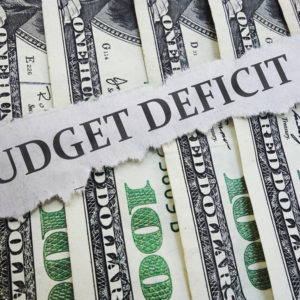In the debate unfolding in our country over federal deficits and debt, one fundamental argument is generally overlooked: What we politely call our “structural deficit” is really a chronic inability to set priorities. In a way, we have forgotten as a nation, as a society, how to determine what is more important and what is less important.
It’s no wonder that our politics has devolved into a series of squabbles over side issues, that our people are up to their eyeballs in debt, that wages and growth are slack, and that our foreign relations are in disarray.
The Constitution of the United States explicitly assigns the power to set taxes and tariffs, raise revenue, and incur public debt to the Congress (Article 1, Sections 7 and 8). Moreover, in Article 1, Section 9, the Constitution provides that public money may not be spent without having been appropriated by the Congress.
Finally, the Impoundment Control Act of 1974, as affirmed in different ways by the Supreme Court in 1975 and 1998, requires the executive to spend monies as appropriated by Congress.
Taken together, these provisions of constitutional law and practice mean that the Congress, and the Congress alone, has the power and the authority to set the nation’s spending priorities and must take responsibility before the voters for levying the taxes required to carry out those priorities.
From this perspective, the chronic federal budget deficits of the past half century suggest a sort of dereliction of duty on the part of the Congress. When competing spending priorities come up for consideration, the Congress resolves the conflict not by choosing one, but by providing money for both. And when spending exceeds revenue, instead of going before the American people and explaining why additional revenue is necessary to advance the national interest, the Congress borrows.
Which will better advance the national interest: to support Ukraine in its fight with Russia, or to fund school lunches for disadvantaged children? To clean up a toxic waste dump in Ohio, or to build a courthouse in Arizona? To send a labor attaché to Mexico in support of USMCA implementation, or to put more computers in public schools?
The federal budget of the United States contains millions of trade-offs like this, and the Congress confronts these apples-vs.-oranges choices every day. In a properly functioning budget, the result would be a clear statement of American values and purpose: these are the things we must do to make America more secure and more prosperous, and those are things we need not do — and here is the money.
But our budget is not a clear statement of values and priorities. On the contrary, our government budget almost pretends that the principle of opportunity cost — the core insight of market economics that resources are scarce and that choices must be made — has been rescinded. The problem, of course, is that opportunity cost is a reality and assuming it away is a fantasy.
Moreover, we have been able to finance these deficits for almost 20 years with interest rates near zero. What does a zero rate of interest mean? It means that there is no opportunity cost of money, that businesses and consumers needn’t choose between alternatives because they can have everything they want.
In this environment, what measure should a business use when deciding between alternative investment opportunities? Between an investment in innovation and a stock buy-back, or a raise for its CEO? Is it any wonder that young people borrow $200,000 to get a degree in English from Harvard, when one from a good state school would do just as well, and cost one-fourth as much?
Sooner or later, this merry-go-round will stop, and we will have to re-learn how to set priorities and make choices. As with an actual merry-go-round, there are really only two ways for it to stop. Either it breaks down in a crisis, which could take the form of rising interest rates and inflation that put millions of people out of work and out of their homes, impoverish a generation of retirees, and undermine our democracy and social peace.
Or we decide to turn it off now, when we have a strong economy and low unemployment, putting our government finances, our national security, and our prosperity on a firm footing for the future.
The choice is ours.

